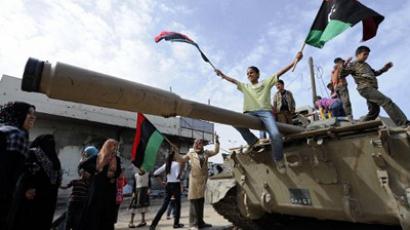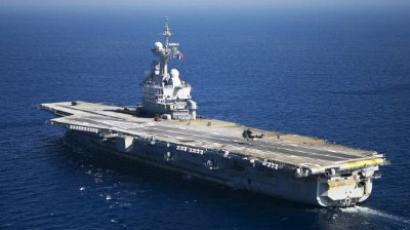Make money, make war: UK profits from Libya mess
NATO may have ended its operations in Libya, but the Western presence is far from over, with big companies replacing the warplanes. The countries that bombed the oil-rich state are now getting lucrative contracts to rebuild it.
First, British bombs tore it apart. Now, British companies will get paid to put it back together. Libya is open for business, and UK firms are being encouraged to join the gold rush.“Libya is a relatively wealthy country with oil reserves, and I expect there will be opportunities for British and, indeed, other companies to get involved in the reconstruction of Libya,” British Defense Secretary Philip Hammond has said. He is urging CEOs and sales directors to “pack their suitcases” and head to the North African country.The UK’s bill for its part in the NATO intervention in Libya is estimated at just under US $500 million. But according to the UK Department of Trade and Investment, the value of contracts to rebuild Libya, in areas ranging from electricity and water supplies to healthcare and education, could amount to upwards of US $300 billion over the next 10 years. And the British government will make sure it takes a leading role in that, just as it did in the war.And this is what is raising more questions about the UK’s motives in playing such a big role in the recent conflict. John Hilary, the executive director at the War on Want anti-poverty charity, says it has shades of post-war Iraq, when companies from countries involved in the Allied invasion were awarded all the best gigs.“We bomb, we destroy, and then we get the contracts to rebuild afterwards,” he told RT. “For us [Britain], it’s always been about those commercial interests ever since BP and Shell went back into Libya after the sanctions were lifted 10 years or so ago. For us, it’s got this commercial edge to the entire thing.”Journalist John Pilger says there was evidence of bartering before NATO even got involved.“The west is establishing another client in Libya. Libya is the source of more oil than any other country in Africa, including Nigeria,” he said. “The National Transition Council told the French that if they sent in their airplanes they would give Total 35 per cent of the oil reserves. There’s so much evidence for what the thing really is.”The UK Department for Trade and Investment already has staff on the ground in Libya, ready to welcome British companies awarded contracts. Wanting to get in on the action, are oil firms Shell and BP, whose shares rose on the news they were talking to the transitional government. Engineering firms Arup and Mott MacDonald are also reportedly keen. Both the latter refused to put up spokesmen when asked, preferring instead to send basic statements, which, critics say, is a new tactic to avoid defending their ethics.“Companies have now seen that it’s a better PR for them not to be involved in any form of public discussion of why they are doing, what they are doing around the world,” John Hilary continued. “It’s about holding them to account for what they do, and not allowing them to get away with putting up a wall of silence.”So far, the conflict in Libya looks like an excellent investment: US $500 million to oust a dictator, with a return of US $300 billion in business contracts when it is all over. Now that humanitarian goals no longer need to be touted, war suddenly makes great business sense.














